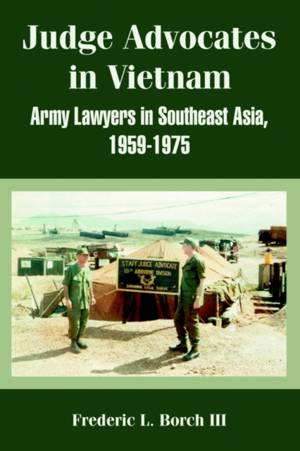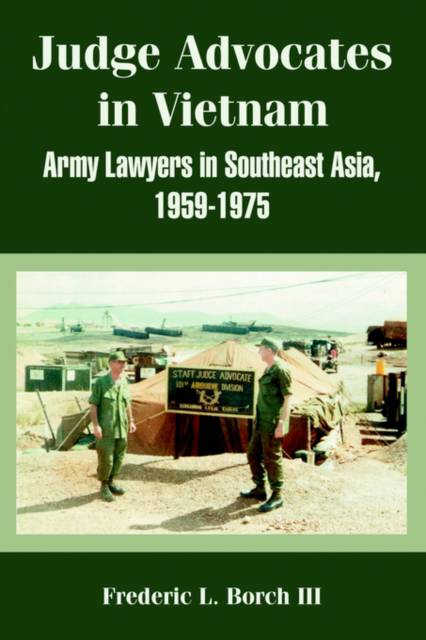
- Retrait gratuit dans votre magasin Club
- 7.000.000 titres dans notre catalogue
- Payer en toute sécurité
- Toujours un magasin près de chez vous
- Retrait gratuit dans votre magasin Club
- 7.000.0000 titres dans notre catalogue
- Payer en toute sécurité
- Toujours un magasin près de chez vous
Judge Advocates in Vietnam
Army Lawyers in Southeast Asia, 1959-1975
Frederic L Borch
Livre broché | Anglais
15,45 €
+ 30 points
Format
Description
Although the first American soldiers arrived in Saigon in late 1950, the first Army judge advocate did not deploy to Vietnam until 1959, when Lt. Col. Paul J. Durbin reported for duty. From then until 1975 when Saigon fell and the last few U.S. military personnel left Vietnam, Army lawyers played a significant role in what is still America's "longest war." Judge Advocates in Vietnam: Army Lawyers in Southeast Asia (1959-1975) tells the story of these soldier-lawyers in headquarters units like the Saigon-based Military Assistance Advisory Group and Military Assistance Command, Vietnam (MACV). But it also examines the individual experiences of judge advocates in combat organizations like II Field Force, 1st Air Cavalry Division, and the 25th Infantry Division. Almost without exception, Army lawyers recognized that the unconventional nature of guerrilla warfare required them to practice law in new and non-traditional ways. Consequently, many judge advocates serving in Vietnam between 1959 and 1975 looked for new ways to use their talent and abilities -both legal and non-legal- to enhance mission success. While this was not what judge advocates today refer to as "operational law" -that compendium of domestic, foreign, and international law applicable to U.S. forces engaged in combat or operations other than war- the efforts of these Vietnam-era lawyers were a major force in shaping today's view that judge advocates are most effective if they are integrated into Army operations at all levels. Judge Advocates in Vietnam is not the first book about lawyering in Southeast Asia. On the contrary, Maj. Gen. George S. Prugh's Law at War, published in 1975, was the first look at what judge advocates did in Vietnam. General Prugh's monograph, however, focuses exclusively on legal work done at MACV. Similarly, Col. Fred Borch's Judge Advocates in Combat: Army Lawyers in Military Operations from Vietnam to Haiti has a chapter on law in Southeast Asia, but it is a very brief look at military lawyering in Vietnam. It follows that this new Combat Studies Institute publication is long overdue. Its comprehensive examination of judge advocates in Vietnam -who was there, what they did, and how they did it- fills a void in the history of the Army and the Judge Advocate General's Corps. At the same time, anyone who takes the time to read these pages will come away with a greater appreciation of what it was like to serve as a soldier -and an Army lawyer- in Vietnam. Thomas J. Romig Major General, U.S. Army The Judge Advocate General
Spécifications
Parties prenantes
- Auteur(s) :
- Editeur:
Contenu
- Nombre de pages :
- 176
- Langue:
- Anglais
Caractéristiques
- EAN:
- 9781410217721
- Date de parution :
- 28-10-04
- Format:
- Livre broché
- Format numérique:
- Trade paperback (VS)
- Dimensions :
- 152 mm x 229 mm
- Poids :
- 267 g

Les avis
Nous publions uniquement les avis qui respectent les conditions requises. Consultez nos conditions pour les avis.






